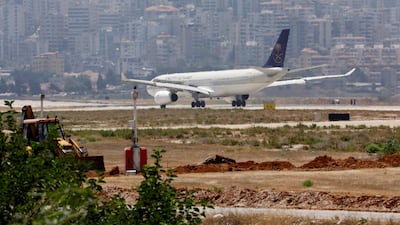Live updates: Follow the latest news on Israel-Gaza
Civilian airliners arriving at Beirut's airport are having to use alternatives to GPS to help them land because of jamming and “spoofing” blamed on Israel, which risks interfering with flight navigation.
Since the onset of the war on Gaza and the related conflict in south Lebanon, Israel has admitted to increasing GPS jamming in the region in a bid to thwart attacks by Hamas and the Lebanese armed group Hezbollah.
Earlier this week a Turkish Airlines flight ran into difficulties as it began its descent into Beirut because it was still using GPS navigation. It circled the airport for around 40 minutes before having to return to Turkey.
The alternatives to GPS for landing are completely safe, but the jamming and spoofing – which involves tricking the aircraft's receiver into calculating a false position that could send the pilot off course – add yet another complication for a region in conflict.
“If they don't use the GPS signal, they will be using the ground-based equipment … which is not affected by any spoofing,” said an industry insider.
The problem of military electronic warfare disrupting aircraft navigation has been faced in the Middle East before, in southern Turkey and other parts of the world.
Electronic warfare often involves jamming enemy communications and navigation systems – typically to interfere with drones and missiles that use GPS to find targets.
While this area of warfare has been in development for decades, it is only in recent conflicts that it has had a major impact on civilian aircraft.

European civil aviation authorities warned of an increase in GPS jamming in February 2022, during the onset of Russia's invasion of Ukraine, and the problem persists near the conflict zone.
Since October 7, there has been a rise in GPS spoofing. Whereas a pilot will immediately know if they are being affected by GPS jamming, spoofing can be harder to spot, said Mohammed Aziz, a retired pilot and adviser to the chairman of Middle East Airlines, Lebanon's flag carrier.
Last November, the EU's Aviation Safety Agency issued a bulletin warning that it noticed an increase in the jamming and spoofing of global navigation satellite systems – with major areas including the south-eastern Mediterranean, the Middle East and the Black Sea.
As a result, Lebanon's civil aviation agency told airline companies to stop using GPS and switch to conventional ground-based navigation systems. The radar used by air traffic controllers does not rely on satellites.
“The problem is the pilot might not notice [spoofing] if he is relying entirely on GPS,” said Mr Aziz. He said pilots should ensure “the signal you have on the GPS corresponds to the signal you are getting from the ground navigation, make sure you report your position to the air-traffic controller so they can confirm your position.”
The EU's safety agency (ASA) recommended that air operators “remain prepared to revert to a non-GNSS [global navigation satellite systems] arrival procedure where appropriate”.
Earlier this month Lebanon's transport minister, Ali Hamieh, warned that GPS jamming “poses a significant risk to all airlines” as he pointed the finger of blame at Israel.
The Lebanese government has submitted a complaint to the UN's Security Council over the jamming and its “recklessness”.
If GNSS is not fully functioning, problems also include inconsistent flight guidance – which can result in route deviations – as well as the inability to use it for navigation.
But while there are alternatives to GPS, the loss of it is still felt by pilots.
“The aircraft these days depend on the GPS so much. Using the GPS relieves the pilot and his first officer from a load of work during the flight. This is why lots of errors are occurring during flights – like the Turkish Airlines [flight] … aircraft are still using GPS,” said the insider.
Middle East Airlines is used to landing in Beirut without GPS. It has used its instrument landing system – which utilises radio beams – to land there since the onset of the Syrian Civil War. But that system does require additional work from the pilot.
“The problem is if you are not aware. We are used to the area, we used to fly on the radar to come into Beirut,” said Mr Aziz. “But if you are from outside and if you don't notice [spoofing], this is a problem for a pilot that comes to Beirut once every six months.”

